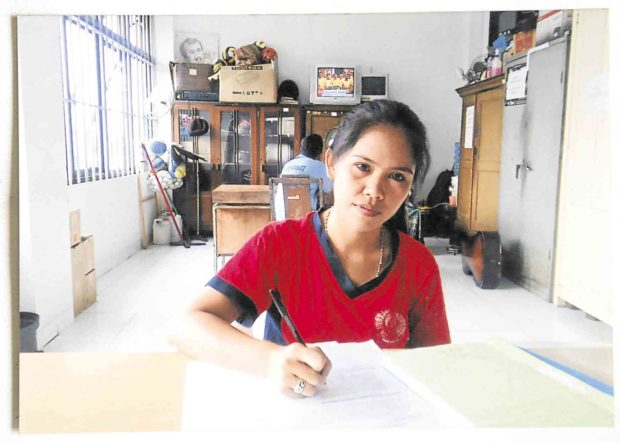Supreme Court ruling raises hope for Mary Jane Veloso

A CHANCE AT FREEDOM Mary Jane Veloso in April 16, 2015, file photo taken at a jail facility in Yogyakarta, Indonesia. —CONTRIBUTED
MANILA, Philippines — In a ruling that could downgrade the drug trafficking conviction of Mary Jane Veloso, a Filipino woman currently imprisoned in Yogyakarta, Indonesia, the Supreme Court has allowed her testimony against her job recruiters to be taken by way of deposition.
This means that Veloso no longer needs to personally testify against her illegal recruiters in court, but can answer questions from her prison cell. Lawyers for the recruiters who are also facing charges of human trafficking can send her the written questions.
The Supreme Court’s Third Division on Wednesday granted the petition filed by Veloso’s lawyers and reversed the Court of Appeals’ (CA) December 2017 decision stopping the Nueva Ecija Regional Trial Court (RTC) from allowing the prosecution to take Veloso’s deposition.
The high court, in a decision written by Justice Ramon Paul Hernando, reinstated and affirmed with modification the RTC ruling and ordered that Veloso’s deposition be taken before Philippine consular officials in Indonesia in compliance with the Rules of Court and principles of jurisdiction.
Due process
Article continues after this advertisement“To disallow the written interrogatories will curtail Mary Jane’s right to due process,” the Supreme Court said.
Article continues after this advertisementVeloso’s lawyer Edre Olalia, president of the National Union of Peoples’ Lawyers (NUPL), welcomed the court’s decision.
“We are elated that finally, our Highest Court has ruled favorably on our prayer that our client Mary Jane Veloso be allowed to speak out fully and put things on judicial record the horrible ordeal she went through,” he said.
“With this ruling, we are hopeful that the truth, the whole truth, and nothing but the truth will come out and that … it will decisively and ultimately impel Indonesia to make [Veloso’s] reprieve permanent, or free her by any legal or political means,” he also said.
Veloso was arrested in April 2010 at Yogyakarta airport in Indonesia after 2.2 kilograms of heroin were discovered in her luggage.
Sentenced to death
Originally sentenced to death by firing squad in October 2010, Veloso was granted a last-minute reprieve in April 2015 after the surrender of her recruiters, Maria Cristina Sergio and her live-in partner Julius Lacanilao, in the Philippines.
Veloso claimed that Sergio and Lacanilao, who were her neighbors in Talavera, Nueva Ecija, had recruited her for what turned out to be a nonexistent job in Malaysia. She said they later provided her with a ticket for a holiday in Indonesia, with the assurance that a job in Malaysia would be waiting upon her return. They also gave her the luggage that turned out to be stuffed with drugs, Veloso said.
Indonesian authorities have said that Veloso’s execution had been postponed out of respect for the Philippines’ legal processes and to allow her to participate in the trial against her recruiters.
In its ruling, the high court took a more liberal view of Section 15, Rule 119 of the Rules of Court, which provides that when a witness for the prosecution is “too sick or infirm to appear at the trial as directed by the court, or has to leave the Philippines with no definite date or returning, he may forthwith be conditionally examined before the court where the case is pending.”
The court held that such was not the case of Veloso, whose imprisonment denies her of any opportunity to voluntarily appear and testify before the RTC where the cases of the respondents of illegal recruitment were pending.
Human trafficking
Veloso’s family also brought separate charges of human trafficking and fraud against Sergio and Lacanilao before the justice department.
Nueva Ecija RTC Judge Anarica Castillo-Reyes had granted the prosecution’s motions to take Veloso’s deposition as she could not appear in court, but this was delayed by a petition filed by the two recruiters who were represented by lawyers from the Public Attorney’s Office.
The CA had blocked the deposition twice, citing the right of the accused to confront Veloso face to face.
In September 2018, Veloso’s parents Cesar and Celia, represented by NUPL, asked the Supreme Court to overrule the CA and allow their daughter to give a deposition from her prison cell.
Olalia said the NUPL hoped that the Supreme Court ruling would eventually lead to Veloso’s recruiters being made to pay.
“[We also hope] that this precedent will contribute to providing succor to many others who will be victims of circumstance and injustice, which can all be traced to our economic and social ills,” he added.
Asked if NUPL and government lawyers would be allowed to assist Veloso in giving her statement in Indonesia, the NUPL official said it was still up to the court to determine parameters.
“It depends on our Supreme Court and also the regional trial court [where Veloso’s recruiters are facing numerous charges.] It also depends on arrangements made by our foreign affairs and justice departments with their counterparts [in Indonesia],” Olalia said. —With Tetch Torres-Tupas, INQUIRER.net and INQUIRER ARCHIVES